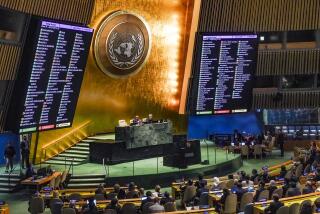U.N. Approves Peacekeeping Force
- Share via
UNITED NATIONS — Peacekeepers will be dispatched to Kabul this weekend under a U.N. Security Council resolution approved Thursday that authorizes an international force to safeguard the area around the Afghan capital over the next six months.
The resolution, passed unanimously after two weeks of closed-door debate, formally endorses Britain’s offer “to take the lead in organizing and commanding” the force. An initial contingent of about 200 British troops has begun arriving in Kabul before the new interim government is sworn in on Saturday. “The United Kingdom is ready to go,” Jeremy Greenstock, British ambassador to the United Nations, said after the vote.
Deliberately not mentioned in the resolution is the subordinate relationship of U.N.-authorized peacekeepers to U.S. forces in the country.
The British government, in a letter to the Security Council on Wednesday, said that although its mission would have a distinct mandate and command structure, the Pentagon should retain ultimate control over foreign forces in Afghanistan.
The British also said they would lead the peacekeeping mission only until April 30, when their troops would be withdrawn. Some American forces are expected to remain well beyond that point.
Washington had argued for some form of coordinating power over all allied troops in the country in order to avoid inadvertent casualties or even confrontations among friendly forces.
“We need to make sure that the international assistance force does not in any way interfere with our efforts to root out the remaining elements of Al Qaeda and the Taliban,” U.S. Ambassador John Negroponte said Thursday.
There must be “a clear-cut division of labor between the two forces,” Negroponte said, with peacekeepers confined to security responsibilities in and around Kabul while American forces wage war elsewhere in the country.
The Security Council also declined to specify the size of the peacekeeping force, an issue of considerable tension with the new regime in Kabul. The Afghans favor a limited armed foreign presence, numbering in the hundreds, but European nations are offering to contribute 5,000 or more troops. France, Italy and Spain all have offered to provide soldiers, along with Canada, Turkey and Jordan.
The German government, which risked its parliamentary majority to secure support for sending troops to Afghanistan, was unwilling for domestic reasons to submit to formal U.S. command over the mission.
But the Security Council’s artful ambiguity--authorizing a force led by the British, who will in turn voluntarily defer to the Americans--was apparently sufficient to satisfy German political qualms. The government now expects to get approval from Parliament on Saturday to send troops to Afghanistan, German diplomats at the U.N. said.
Italy’s rightist government, defying strong domestic opposition, said it welcomed the Pentagon’s role in the peacekeeping endeavor. Antonio Martino, Italy’s defense minister, said U.S. Defense Secretary Donald H. Rumsfeld told him that American troops would be ready to help in “pulling [peacekeeping] forces out” of dangerous areas.
Martino said Italy will send as many as 600 soldiers to Kabul, with the first due to arrive shortly after Christmas, the Italian mission to the U.N. reported.
The new Afghan leaders tried and failed to limit the peacekeeping mission to narrow law-and-order responsibilities, with little authority to respond to direct attacks on its own personnel. But on Wednesday, Afghan Foreign Minister Abdullah wrote to the Security Council agreeing to British demands that the force be sent under U.N. provisions that give the troops broad authority to defend themselves. The Security Council called on the Northern Alliance and other factions in the interim government to “withdraw all military units from Kabul” and cooperate fully with the new foreign forces.
Still to be faced is the issue of financing the effort. The Security Council resolution Thursday set up a special trust fund, but Japan is among the few nations that have announced they would contribute. Member states that are not sending troops were urged to donate equipment as well as money.
Although Western European forces in Afghanistan will cover their own expenses, Turkey and Jordan have said they would need financial assistance to participate. Turkey is expected to become a critical component of the peacekeeping force, with some Security Council members supporting its offer to lead the mission after Britain withdraws in April.
The U.N. has been eager to get a peacekeeping force on the ground to protect aid workers, who have been targets of robbery and armed assault.
But with peacekeepers deployed only around Kabul, there will be no international protection for U.N. workers and aid convoys in more dangerous--and more impoverished--parts of Afghanistan.
More to Read
Sign up for Essential California
The most important California stories and recommendations in your inbox every morning.
You may occasionally receive promotional content from the Los Angeles Times.













